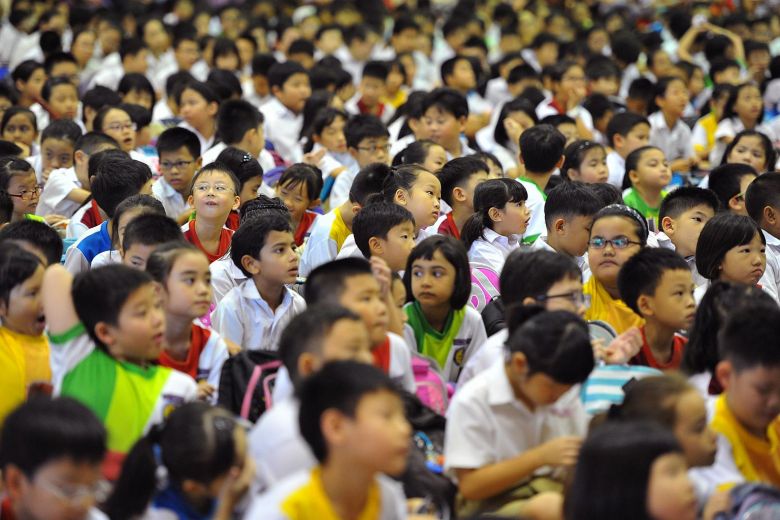Kurzweil
JF-Expert Member
- May 25, 2011
- 6,622
- 8,397
Waziri wa Elimu Ong Ye Kung amesema kuwa kuanzia mwakani hakuta kuwa na ripoti za kuwapanga wanafunzi kulingana na viwango vya ufaulu
Wazazi watapokea taarifa za watoto wao kupitia vikao vya uongozi wa shule na wazazi. Aidha, mitihani kwa wanafunzi wa chekechea na darasa la kwanza imeondolewa
Waziri Kung amesema kuwa hatua hii imechukuliwa ili kuwapa wanafunzi fursa ya kuzingatia masomo yao na sio kushindana na wengine
Waziri huyo ameongeza kuwa hatua hii imelenga kuwajengea utaratibu wa kujifunza zaidi na sio kutafuta matokeo ya juu katika mitihani
======

Whether a child finishes first or last will no longer be indicated in primary and secondary school report books from next year in Singapore, – a move which Education Minister Ong Ye Kung hopes will show students that “learning is not a competition”.
Report books will not just stop showing a student’s position in relation to class or cohort. The information to be dropped includes:
From next year all examinations for Primary 1 and 2 pupils will also be removed, and whatever forms of assessment they have will not count towards an overall grade.
The MOE said that teachers will continue to gather information about pupils’ learning through discussions, homework and quizzes. Schools will use other ways like “qualitative descriptors”, in place of marks and grades, to evaluate pupils’ progress at these two levels.
For older students in primary schools and secondary schools, marks for each subject will be rounded off and presented as a whole number, without decimal points – to reduce the focus on academic scores. Parents will continue to receive information about their child’s progress in school during parent-teacher meetings.
In an address to some 1,700 school leaders earlier this week, Mr Ong said: “I know that ‘coming in first or second’, in class or level, has traditionally been a proud recognition of a student’s achievement. But removing these indicators is for a good reason, so that the child understands from young that learning is not a competition, but a self-discipline they need to master for life.
“Notwithstanding, the report book should still contain some form of yardstick and information to allow students to judge their relative performance, and evaluate their strengths and weaknesses.”
–
Source: StraitTimes
Wazazi watapokea taarifa za watoto wao kupitia vikao vya uongozi wa shule na wazazi. Aidha, mitihani kwa wanafunzi wa chekechea na darasa la kwanza imeondolewa
Waziri Kung amesema kuwa hatua hii imechukuliwa ili kuwapa wanafunzi fursa ya kuzingatia masomo yao na sio kushindana na wengine
Waziri huyo ameongeza kuwa hatua hii imelenga kuwajengea utaratibu wa kujifunza zaidi na sio kutafuta matokeo ya juu katika mitihani
======

Whether a child finishes first or last will no longer be indicated in primary and secondary school report books from next year in Singapore, – a move which Education Minister Ong Ye Kung hopes will show students that “learning is not a competition”.
Report books will not just stop showing a student’s position in relation to class or cohort. The information to be dropped includes:
- Class and level mean
- Minimum and maximum marks
- Underlining and/or colouring of failing marks
- Pass/fail for end-of-year result
- Mean subject grades
- Overall total marks
- L1R5 (English plus five relevant subjects), L1R4 , EMB3 (English, maths, best three subjects) and EMB1 for lower secondary levels
From next year all examinations for Primary 1 and 2 pupils will also be removed, and whatever forms of assessment they have will not count towards an overall grade.
The MOE said that teachers will continue to gather information about pupils’ learning through discussions, homework and quizzes. Schools will use other ways like “qualitative descriptors”, in place of marks and grades, to evaluate pupils’ progress at these two levels.
For older students in primary schools and secondary schools, marks for each subject will be rounded off and presented as a whole number, without decimal points – to reduce the focus on academic scores. Parents will continue to receive information about their child’s progress in school during parent-teacher meetings.
In an address to some 1,700 school leaders earlier this week, Mr Ong said: “I know that ‘coming in first or second’, in class or level, has traditionally been a proud recognition of a student’s achievement. But removing these indicators is for a good reason, so that the child understands from young that learning is not a competition, but a self-discipline they need to master for life.
“Notwithstanding, the report book should still contain some form of yardstick and information to allow students to judge their relative performance, and evaluate their strengths and weaknesses.”
–
Source: StraitTimes